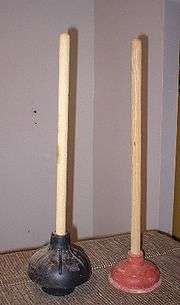Definify.com
Webster 1913 Edition
Plunger
Plun′ger
,Noun.
1.
One who, or that which, plunges; a diver.
2.
A long solid cylinder, used, instead of a piston or bucket, as a forcer in pumps.
3.
One who bets heavily and recklessly on a race; a reckless speculator.
[Cant]
4.
(Pottery)
A boiler in which clay is beaten by a wheel to a creamy consistence.
Knight.
5.
(Gun.)
The firing pin of a breechloader.
Plunger bucket
, a piston, without a valve, in a pump.
– Plunger pole
, the pump rod of a pumping engine.
– Plunger pump
, a pump, as for water, having a plunger, instead of a piston, to act upon the water. It may be single-acting or double-acting
Webster 1828 Edition
Plunger
PLUNG'ER
,Noun.
1.
A cylinder used as a forcer in pumps.Definition 2026
plunger
plunger
English

Two types of household plungers (used for removing blockages).
Noun
plunger (plural plungers)
- A device that is used to remove blockages from a toilet or sink by suction.
- The internal piece of a syringe that pushes out or pulls in any contents.
- The sliding activator of an exploder, an electrical generator used to trigger electrical detonators such as blasting caps.
- The part of a cafetière that is pushed down to remove grounds from coffee.
- One who plunges; a diver.
- A device similar to a piston but without a mechanism; a long solid cylinder used, instead of a piston or bucket, as a forcer in pumps.
- The moving portion of solenoid.
- (pinball) The spring-loaded assembly that propels the ball onto the table.
- (dated, slang) A reckless gambler.
- (pottery) A boiler in which clay is beaten by a wheel to a creamy consistency.
- (Can we find and add a quotation of Knight to this entry?)
- (firearms) The firing pin of a breechloader.
Synonyms
- (device): plumber's helper (colloquial), plumber's friend (colloquial)
Derived terms
Translations
device for removing blockages by suction
|
sliding activator of an exploder
one who plunges
Old French
Verb
plunger
- (Anglo-Norman) Alternative form of plongier
Conjugation
This verb conjugates as a first-group verb ending in -er. In the present tense an extra supporting e is needed in the first-person singular indicative and throughout the singular subjunctive, and the third-person singular subjunctive ending -t is lost. In addition, g becomes j before an a or an o to keep the /dʒ/ sound intact. Old French conjugation varies significantly by date and by region. The following conjugation should be treated as a guide.
Conjugation of plunger (see also Appendix:Old French verbs)
| simple | compound | ||||||
|---|---|---|---|---|---|---|---|
| infinitive | plunger | avoir plungé | |||||
| gerund | en plunjant | Use the gerund of avoir followed by the past participle | |||||
| present participle | plunjant | ||||||
| past participle | plungé | ||||||
| person | singular | plural | |||||
| first | second | third | first | second | third | ||
| indicative | jo | tu | il | nos | vos | il | |
| simple tenses |
present | plunge | plunges | plunge | plunjons | plungez | plungent |
| imperfect | plunjoie, plungeie, plunjoe, plungeve | plunjoies, plungeies, plunjoes, plungeves | plunjoit, plungeit, plunjot, plungeve | plungiiens, plungiens | plungiiez, plungiez | plunjoient, plungeient, plunjoent, plungevent | |
| preterite | plunjai | plunjas | plunja | plunjames | plunjastes | plungerent | |
| future | plungerai | plungeras | plungera | plungerons | plungeroiz, plungereiz, plungerez | plungeront | |
| conditional | plungeroie, plungereie | plungeroies, plungereies | plungeroit, plungereit | plungeriiens, plungeriens | plungeriiez, plungeriez | plungeroient, plungereient | |
| compound tenses |
present perfect | Use the present tense of avoir followed by the past participle | |||||
| pluperfect | Use the imperfect tense of avoir followed by the past participle | ||||||
| past anterior | Use the preterite tense of avoir followed by the past participle | ||||||
| future perfect | Use the future tense of avoir followed by the past participle | ||||||
| conditional perfect | Use the conditional tense of avoir followed by the past participle | ||||||
| subjunctive | que jo | que tu | qu’il | que nos | que vos | qu’il | |
| simple tenses |
present | plunge | plunges | plunge | plunjons | plungez | plungent |
| imperfect | plunjasse | plunjasses | plunjast | plungissons, plungissiens | plungissoiz, plungissez, plungissiez | plunjassent | |
| compound tenses |
past | Use the present subjunctive of avoir followed by the past participle | |||||
| pluperfect | Use the imperfect subjunctive of avoir followed by the past participle | ||||||
| imperative | – | tu | – | nos | vos | – | |
| — | plunge | — | plunjons | plungez | — | ||